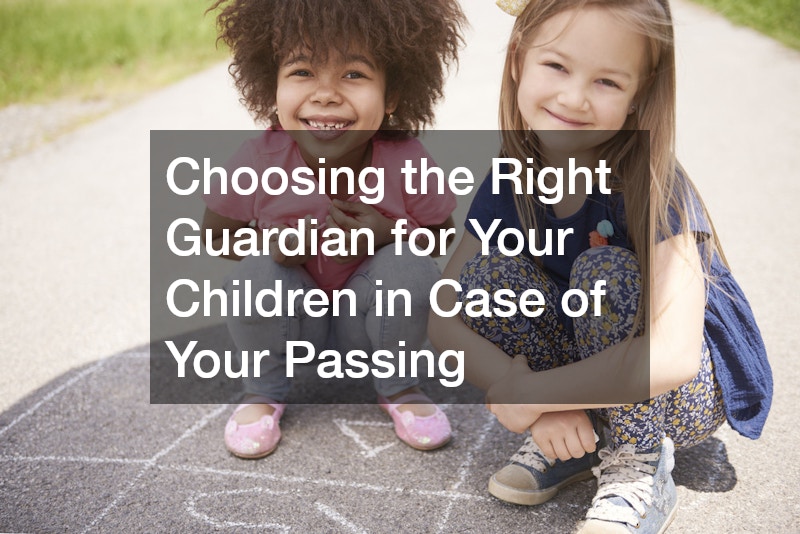
You never know what the future holds, but being prepared is part of the journey. This article discusses the critical considerations and decisions involved in selecting a guardian for your children in the unfortunate event of your untimely passing. It aims to address common concerns and provides guidance to ensure that your children are cared for by someone you trust. The process of choosing a guardian is not only a legal or financial exercise but also an emotional and personal journey. Working with a guardianship attorney can simplify this process and ensure you select the right candidate.
How to Evaluate Potential Guardians
Assessing Values and Parenting Styles
To ensure a potential guardian aligns with your expectations, it’s important to assess their values and parenting styles. This alignment helps maintain consistency in your children’s upbringing, contributing to their emotional stability.
Consider whether the potential guardian shares your views on education, discipline, and lifestyle.
Parenting styles can greatly influence a child’s development, making it crucial for the selected guardian to have similar approaches to daily routines. Observe how they interact with children, and seek feedback from mutual acquaintances about their nurturing style. This assessment can prevent conflicts and ensure that your children are raised in an environment similar to what you would provide.
Values such as respect, kindness, and integrity are integral to a child’s moral development. It’s beneficial to choose someone who embodies these qualities and will instill them in your children. This value alignment supports the continuity of family traditions and cultural influences that shape your children’s identity.
Financial Stability and Responsibility
Financial stability is crucial for a guardian tasked with raising children. When selecting a guardian, consider their ability to provide for your children’s needs, including education, healthcare, and extracurricular activities. Financial responsibility is indicative of how well the guardian can manage resources to benefit your children.
Evaluate the potential guardian’s current financial situation, including their income, debts, and spending habits. This assessment will help ensure that your children will not face financial difficulties that could impact their quality of life. Open discussions about potential financial support or trust funds can provide additional insights into the guardian’s preparedness to manage such responsibilities.
While you may provide financial resources through life insurance or savings, the guardian’s financial acumen ensures those resources are well-managed. You may also need to consider if the guardian has other dependents and how this might affect their financial situation. Such evaluations help in minimizing potential financial stress on the guardian, allowing them to focus on raising your children.
Emotional and Physical Capability
Raising children requires both emotional and physical capability from the guardian. They need to be emotionally stable and mature, with the resilience to cope with the challenges of parenting. Assessing their emotional capacity is crucial as it influences how they will provide emotional support to your children.
Physical health is another essential consideration, as it affects the guardian’s ability to engage in active parenting. Understanding their health history and current lifestyle can give insights into their ability to care for your children effectively. Regular involvement in active pursuits or a healthy lifestyle is an indicator of their physical capacity to take on this responsibility.
Consider also the guardian’s relationship with your children and their ability to form strong emotional bonds. Emotional availability and understanding are necessary for nurturing a child’s development effectively. This relationship is vital for your children’s sense of security and belonging during a challenging transition period.
Legal Considerations in Guardian Selection
Understanding Legal Requirements
Appointing a legal guardian involves understanding specific legal requirements and processes. Each jurisdiction may have different laws governing guardianship, so it’s imperative to research and comply with these regulations. Proper documentation, such as a will or a legal declaration, is necessary to formalize your guardian choice.
The legal system requires that the appointed guardian be an adult capable of taking on legal responsibilities. Understanding these requirements helps in avoiding legal challenges that might arise from an improperly executed guardianship agreement. Additionally, documenting your wishes clearly reduces ambiguity and aids in a smooth legal transition.
Legal certainty also involves considering potential objections from other family members. Preparing legally binding documents makes your wishes clear to all parties involved. Legal advice may be necessary to navigate complex family dynamics and ensure that your guardianship decision stands up to scrutiny.
Consulting with a Guardianship Attorney
Consulting with a guardianship attorney can provide clarity and guidance throughout the guardian appointment process. Legal professionals can offer insights into the complexities of estate planning and guardianship laws. Their expertise ensures that all legal documentation is accurately completed and filed.
An attorney can also address potential legal challenges or conflicts that might arise from family members. Their support is valuable in mediating disagreements and reinforcing the legality of your decisions. Additionally, they can recommend strategies for communicating your wishes effectively in legal documents.
Knowing when to consult a guardianship attorney can be as crucial as the consultation itself. Situations involving complex family structures or significant assets particularly benefit from professional legal advice. This ensures all potential complications are considered and addressed in advance.
Updating Your Will and Important Documents
Updating your will is a critical step in the guardian selection process, ensuring your wishes are current and legally binding. Specific clauses regarding guardianship should be reviewed and modified as family circumstances change. This ongoing review protects your children’s future against unforeseen challenges.
Regular updates to legal documents can accommodate life changes, such as marriage, divorce, or the birth of additional children. These updates should reflect any shifts in your family dynamics or relationships with potential guardians. Keeping these documents current avoids outdated instructions that might not reflect your present wishes.
It’s also essential to notify relevant parties, such as executors or trustees, of any changes to these documents. This ensures that all involved parties are aware of your updated wishes and can act accordingly. Regular revisions of important documents help safeguard your children’s future and reassure your chosen guardian of their role.
Discussing Your Decision with Affected Parties

Communicating with Your Chosen Guardian
Open communication with your chosen guardian is essential in preparing them for their role. Discussing expectations and responsibilities helps eliminate misunderstandings and align on priorities. This dialogue should include discussions about values, lifestyle, and the envisioned future for your children.
Your chosen guardian should be aware of the full scope of responsibilities, including both day-to-day care and long-term planning. Address potential challenges and your expectations regarding education, discipline, and lifestyle. Clarity in these discussions ensures that both parties have a mutual understanding of the roles and expectations.
These conversations provide an opportunity to address any concerns or reservations the guardian might have. Additionally, exploring contingency plans or additional support can reinforce the guardian’s confidence in fulfilling their role. Clear communication builds trust and lays a foundation for a cooperative guardianship arrangement.
Involving Family Members in the Discussion
Involving family members in guardianship discussions is beneficial for maintaining transparency and preventing future conflicts. Early conversations can reduce misunderstandings and provide a forum for addressing concerns. This openness fosters an environment of mutual respect and collaboration.
Family support can be a cornerstone in facilitating a smooth transition for the guardian and children. Encouraging input from close relatives can provide valuable insights or alternative perspectives on your decision. It’s crucial to address any potential disputes proactively to ensure a united family front.
While it’s important to involve family members, maintaining the decision-making power within your preferences is key. Reminding family members of your primary focus on your children’s welfare can help keep discussions productive. This clarity helps reinforce your intentions and the basis for your chosen guardian.
Explaining the Decision to Your Children
Explaining your guardianship decision to your children requires sensitivity and consideration of their emotional maturity. Children need reassurance and a sense of stability, especially during discussions about their future. Tailoring the conversation to their age and understanding helps mitigate anxiety.
Engage your children in open and honest dialogue, allowing them to express their feelings and ask questions. This approach helps them feel valued and involved in the process, even if they aren’t making the decision themselves. A supportive conversation can provide comfort and clarity amidst uncertainty.
Emphasize the reasons for your decision, highlighting the trusted relationship you have with the chosen guardian. Reinforcing the continuity of love and care they will receive reassures your children of their security. Such discussions, when approached thoughtfully, contribute to a smoother adjustment period should the need arise.
The importance of preparing for the unexpected by making informed decisions about guardianship cannot be overstated. This process ensures your peace of mind and the security of your children’s future. Revisiting and updating these plans as circumstances change helps safeguard their well-being and eases transitions during difficult times.
